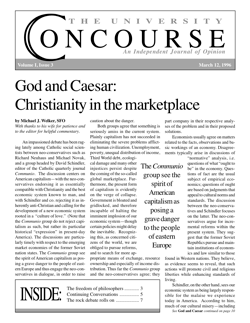Core curriculum (3)
by Katherine Kemmis
As a student devoted to improving my own mind as well as the caliber of the education at this institution, I feel compelled to supply a voice in the on-going debate over the core curriculum. I wish to address in particular those members of the faculty responsible for modifying or ratifying the core curriculum at Franciscan University.
I am disturbed by the lack of consistent direction provided for students in their chosen course of study. Consider the phenomenon of “major change” so prevalent among the members of this student body (myself included.) Most students, it seems, change their major at least once and many perhaps two, three or even (sad to say) four or more times before they graduate. What contribution has this, I ask, to our sense of the unity of truth, and hence to the value of our education?
Far from suggesting that we as students have not the right to determine what we are to study while in college, I suggest rather that we rarely come to Franciscan University equipped with the tools to make such a decision, and all too often leave never having made an informed and satisfactory choice.
I believe the function of a core curriculum should indeed be to provide men and women precisely with that fundamental knowledge Dr. Crosby spoke of, and that the first testimony to its effectiveness and its value is the aid it supplies its students in determining what exactly they ought to study. In this regard, I think, our core curriculum has failed us. Too many of us flounder.
Kathleen van Schaijik appropriately lauded the unique quality of love of truth that study at this University imparts. But I think all too often we succumb to an aimless pursuit of this truth, for we have been provided no substantial archimedic point at which to aim our academic endeavors. One must first know something of the truth to love it intelligently.
It seems we waste a lot of intellectual energy trying to supply ourselves with some sort of direction in our education. How effective then, will our general education finally be in directing us in life?
I ask the faculty to please leave us no longer with the burden of breaking our own educational ground, but rather to provide us with a consistent, ordered, and sufficiently extensive core curriculum, mandated to us at the outset of our education, whereby we might earn the privilege of taking responsibility for our intellectual formation here at Franciscan University.
Katherine Kemmis,Junior, Humanities and Catholic Culture


